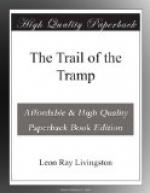In the morning after we had been served with breakfast, we handed her the crosses which we had carefully wrapped in paper so that upon her journey their ominous outlines would not recall unpleasant memories and cause her needless anguish. Then we went back to the bunk house to await the arrival of the train and assist in loading aboard the bagggage that Mrs. McDonald was to take with her into Canada. Only a few minutes had elapsed, when to our surprise, the foreman called us to the door and commanded us to follow him, Mrs. McDonald and Donald, who carried the two crosses we had made for his mother.
We followed them to the little graveyard upon the right-of-way, and while we stood by bareheaded, frail Mrs. McDonald planted the two new crosses at equal distances from the other three, and we saw that upon one of them was written “James” and upon the other “Joseph.” After she had scattered prairie flowers over all the graves, we offered up silent prayers, and then with not a single dry eye in our sad procession, we returned to the reservation.
In the afternoon we flagged the westbound passenger train, and after wishing her God speed, we tenderly placed the sobbing widow and Donald aboard, bound for the then little known and undeveloped western section of Canada, and when the tail end of the train passed us, a sportily dressed fellow, who, with other passengers, was sitting upon the observation platform of the last Pullman, upon perceiving those plain, white crosses, which glared so conspicuously above the green sward of the prairie to the right of the train, while he pointed his finger derisively in their direction, made some remarks to the other passengers, and laughed. He did not know the story of the tragic events which caused their presence nor that under four of the little crosses the hopes and happiness of poor Mrs. McDonald lay buried.
[Illustration: Five crosses look over the railroad tracks]
CHAPTER V.
“The Call of the City.”
It was the “Call of the City”, the true brother of that other curse of humanity, the “Call of the Road”, that had been heard by Joe and Jim. For years previous to their unannounced departure they had felt its subtle influence when they read about the grand city in the newspapers which were occasionally found upon the right-of-way, having been thrown there from the passing trains by passengers who had read them. The “call” had also come to them while listening to the stories of adventure among the wonderful palaces and the sodden slums which comprise every city, which were told them by passing tramps as they stopped to rest, to ask for employment, or more often to beg food at the section house. But the strongest incentive of all was the hoboes, who as they passed by aboard of freight trains, with their feet dangling out of open box car doors or hanging to the mail and express cars of passenger trains, waved friendly greetings to the lads, which they interpreted as a beckoning to the city.




